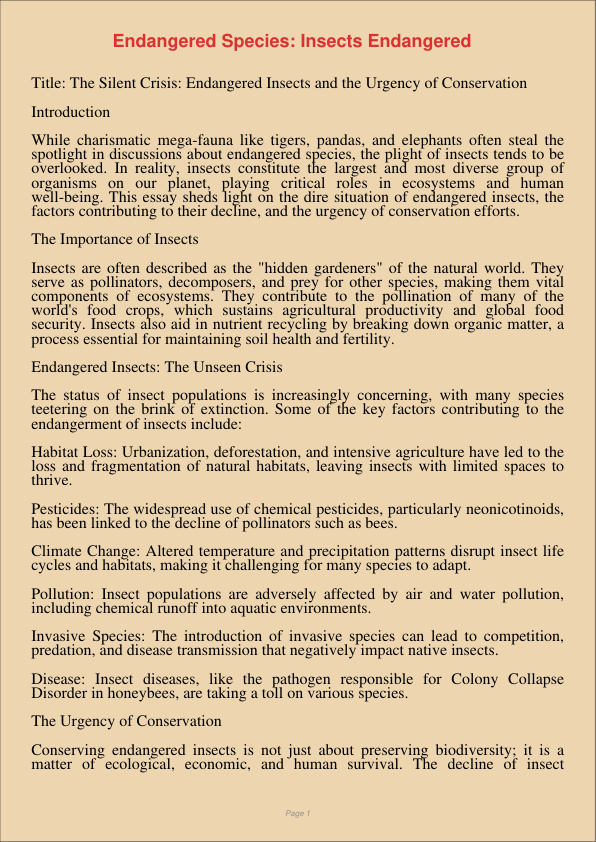Endangered Species Insects Endangered
Dec 31, 2023
insects endangered
endangered species
Engineering and Construction
Environmental Studies
Title: The Silent Crisis: Endangered Insects and the Urgency of Conservation
Introduction
While charismatic mega-fauna like tigers, pandas, and elephants often steal the spotlight in discussions about endangered species, the plight of insects tends to be overlooked. In reality, insects constitute the largest and most diverse group of organisms on our planet, playing critical roles in ecosystems and human well-being. This essay sheds light on the dire situation of endangered insects, the factors contributing to their decline, and the urgency of conservation efforts.
The Importance of Insects
Insects are often described as the “hidden gardeners” of the natural world. They serve as pollinators, decomposers, and prey for other species, making them vital components of ecosystems. They contribute to the pollination of many of the world’s food crops, which sustains agricultural productivity and global food security. Insects also aid in nutrient recycling by breaking down organic matter, a process essential for maintaining soil health and fertility.
Endangered Insects: The Unseen Crisis
The status of insect populations is increasingly concerning, with many species teetering on the brink of extinction. Some of the key factors contributing to the endangerment of insects include:
Habitat Loss: Urbanization, deforestation, and intensive agriculture have led to the loss and fragmentation of natural habitats, leaving insects with limited spaces to thrive.
Pesticides: The widespread use of chemical pesticides, particularly neonicotinoids, has been linked to the decline of pollinators such as bees.
Climate Change: Altered temperature and precipitation patterns disrupt insect life cycles and habitats, making it challenging for many species to adapt.
Pollution: Insect populations are adversely affected by air and water pollution, including chemical runoff into aquatic environments.
Invasive Species: The introduction of invasive species can lead to competition, predation, and disease transmission that negatively impact native insects.
Disease: Insect diseases, like the pathogen responsible for Colony Collapse Disorder in honeybees, are taking a toll on various species.
The Urgency of Conservation
Conserving endangered insects is not just about preserving biodiversity; it is a matter of ecological, economic, and human survival. The decline of insect populations poses significant risks, including:
Food Security: Insects play a critical role in pollinating crops like fruits, vegetables, and nuts. Their decline threatens food production and availability.
Ecosystem Imbalance: Insects are foundational to food webs. A decline in their populations disrupts ecosystems, causing cascading effects on other species.
Soil Health: Insects contribute to nutrient cycling and soil health. Their loss impacts agricultural sustainability and the environment.
Medicine and Science: Insects have contributed to scientific discoveries and are a potential source of pharmaceuticals. Their extinction could impede scientific progress.
Conservation Strategies
To address the crisis of endangered insects, several conservation strategies are essential:
Habitat Protection: Preserving natural habitats is crucial for the survival of insect species. This includes maintaining diverse ecosystems and reducing habitat fragmentation.
Sustainable Agriculture: Promoting sustainable farming practices that reduce pesticide use and protect pollinators is vital.
Insect-friendly Urban Planning: Urban areas can be designed to include green spaces and insect-friendly plants, promoting urban biodiversity.
Reforestation: Planting native trees and plants can help restore habitats and support insect populations.
Public Awareness: Raising awareness about the importance of insects and the threats they face is a critical step toward change.
Conclusion
Endangered insects may be small in size, but their significance is immeasurable. Recognizing the urgency of conserving these vital creatures is essential for the well-being of our ecosystems, agriculture, and overall biodiversity. The silent crisis facing endangered insects must be met with immediate and concerted efforts to protect and preserve these essential organisms. In doing so, we can ensure a more sustainable and balanced future for our planet.
